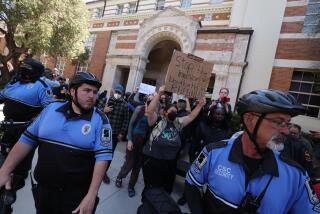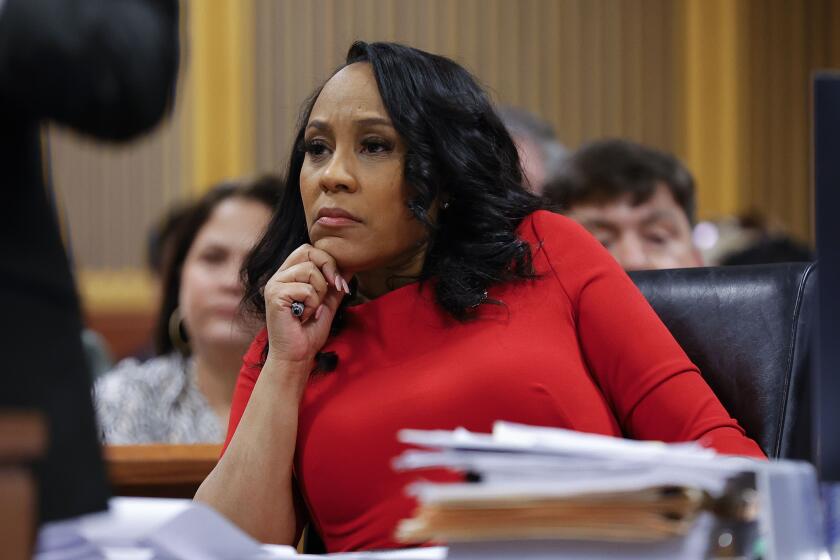Dean Fires Back at Foes, Defends Position on War
Former Vermont Gov. Howard Dean on Thursday rejected his rivals’ criticisms that he is unversed on foreign policy and accused them of obediently following President Bush’s lead on the war with Iraq.
Dean’s remarks intensified the acrimony among the Democratic presidential candidates about their stances on the U.S. invasion of Iraq, a debate that was reignited this week with the capture of former dictator Saddam Hussein.
On Thursday, the Democratic front-runner repeated his view that the capture had not made the United States safer. During a question-and-answer session with an audience, he broadened his critique to say that despite the anti-terrorism efforts of the Bush administration, the country is no safer today than it was on Sept. 10, 2001.
In the last few days, Dean’s opponents have seized on his statement about Hussein, citing it as evidence of the former governor’s lack of experience in foreign policy.
After several days of brushing off his rivals with a few glib asides, Dean responded with a denunciation that lumped Bush together with his Democratic opponents -- or, as he called them, the “Washington politics-as-usual club.”
“I think the Democratic Party has to offer a clear alternative to the American people,” Dean said in remarks hastily tacked onto the beginning of a long-planned speech on domestic policy at the Manchester City Library. “We must make it clear the capture of one very bad man does not mean that this president -- or the Washington Democrats -- can declare victory in the war on terror.”
Dean’s staunch defense of his position on the war came as he delivered a broad speech outlining his domestic policy agenda, which he called “a new social contract for working families.” In it, the former governor embraced the role of Democrats carved out by Franklin D. Roosevelt, saying the government must “provide certain basic guarantees to those who are working hard to fulfill the promise of America.”
He hit on a similar theme in his condemnation of the war, reproaching fellow Democrats in Congress who authorized the invasion and calling the party’s nominating fight a contest “for the soul of the Democratic Party.”
“As distressing as the president’s conduct leading us into the war was the way some Democrats fell meekly in line behind the president,” Dean said. “Instead of standing up for what was right, these Democrats backed away from the fight.
“Then the cost of the war became clear,” he added. “American public opinion began to turn, and the Washington Democrats began to redraft their talking points.”
The former Vermont governor’s refusal to budge on his view of the war will likely help him as he enters the Democratic primary season, even as his stance could make his task difficult in a general election contest against Bush, some political analysts said.
“The views of Democrats on this war are very different from those of the electorate as a whole and even pretty different than independents,” said Charles Cook, editor of the nonpartisan Cook Political Report. “What he says is a gamble. But then again, so is his entire candidacy.”
Speaking to a crowd of about 150 supporters, the former governor never mentioned his rivals by name, and at a news conference after his speech, returned to the breezy posture of the last several days. He refused to respond to specific criticisms by rivals like Missouri Rep. Richard A. Gephardt, who Thursday called Dean’s statement about Hussein “ludicrous.” Dean dismissed such attacks as “blather” and “palaver.”
Asked why he chose to deliver the comments he appended to his speech, Dean joked that “it’s not my nature to be a wallflower.” He denied any concern that the attacks were harming his campaign. Rather, he said, the criticisms of him hurt all Democrats.
“People see that and that turns them off the Democrats,” he said, standing near the political science section in the library’s basement. “I just thought it was time to stand up and make clear there was one Democrat who wasn’t going to succumb to that sort of silliness.”
In his speech, Dean focused on the challenges of middle-class families as he sought to marry various elements of his domestic policy agenda, highlighting his promise of guaranteed access to quality health care, affordable child care and college tuition, and pension protection, as well as incentives to encourage Americans to save for the future.
“While Bill Clinton said that the era of big government is over, I think we have to enter a new era in [the] Democratic Party, not one where we join the Republicans and aim simply to limit the damage that they inflict on working families,” he said.
That prompted a swift rebuttal from Connecticut Sen. Joe Lieberman, who accused Dean of attacking Clinton’s centrist approach to domestic issues.
“It more clearly than ever makes the point that Howard Dean would take the party back and our country back to where we were before Bill Clinton was president,” Lieberman said in a conference call with reporters.
But Dean said he wanted an era of fair government, not big government.
“Under President Clinton, the country moved toward the middle, but under President Bush, we’ve moved the country toward the far right,” he said. “If I want to move the country back toward the middle, which is what I want to do, you have to talk about the issues that other people are apparently unwilling to talk about.”
*
Times staff writer Nick Anderson contributed to this report.
More to Read
Get the L.A. Times Politics newsletter
Deeply reported insights into legislation, politics and policy from Sacramento, Washington and beyond. In your inbox three times per week.
You may occasionally receive promotional content from the Los Angeles Times.







